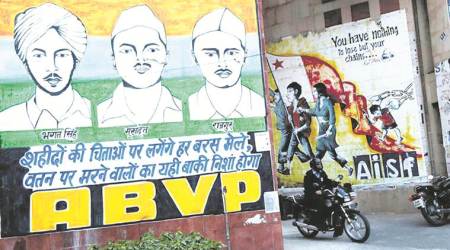 JNU (File Photo)
JNU (File Photo)
Tavleen Singh’s column ‘Waking the deaf’ (IE, August 27) is a one-sided account of her lecture at the teacher’s orientation course held at the Human Resources Development Centre at JNU. We write this rejoinder as two participants of the course, who are both referred to in the column and who also happen to be faculty members of JNU.
We felt that an unthinking antipathy on her part towards JNU led her to make the remark in the early stages of her lecture that speaking against socialism was likely to lead to her being “stoned to death”. Singh has the right to choose whichever words she wants but one of the reasons why one of us objected and referred to this as “hyperbole” was that it proceeded from a stereotype created by the current dispensation and amplified by large sections of the mainstream media — that JNU is a bastion of left-wing intolerance and that it has insignificant academic standing.
The choice of words itself, “stoning to death”, is consciously or unconsciously taken from Taliban Afghanistan and is typical of shrill right-wing rhetoric that seeks to denounce often respectable left-wing academic positions by maliciously hinting at unfounded links with Islamic fundamentalism. The remark was more in the nature of a rant, with little attempt to meaningfully engage with JNU’s intellectualism which may be predominantly left-wing, but is not confined to just this political tendency, and which most certainly still commands respect in academic quarters across the world.
Singh’s lecture was itself, in our view, largely vacuous and one of us tried to point this out in the question and answer session that followed. She has merely referred to the first set of questions as a “tirade” against her column on the Davos conference earlier this year. We would like to remind Singh that the set of questions dwelt upon specific aspects of her lecture such as her enthusiastic support for privatisation and disinvestment, policies initiated in Thatcherite Britain of the 1980s, and found to be extremely problematic. Further, this intervention suggested that there was a “moral case” to be made for socialism, in the light of the glaring inequalities of recent years, especially in the aftermath of the 2007 financial crisis.
The questions which Singh very conveniently neglects to mention in her column, included a word of caution on her extremely laudatory remarks on the Chinese publishing industry when again one of us pointed to the mysterious disappearance of five publishers from Hong Kong in late 2015 and their reappearance in mainland China a few months later. We found very little attempt on the part of Singh to intellectually engage with these issues, which she will perhaps concede were articulated in a polite and civil manner.
Since Singh confines herself to just her Davos conference column, let us focus on this itself. We agree with her that this year the cynosure of all eyes was China’s Xi Jinping. Our objection to her Davos column is that she, to repeat an expression that one of us used, was simply “bowled over” by the glitz and glamour of it all. This leads to an inability on her part to even begin to appreciate the fact that some of the most enthusiastically pro-globalisaton economists such as Dambisa Moyo, speaking at the conference, accepted that there have been significant losses as a result of globalisation. Singh suggested that the subject of her lecture was socialism and not globalisation, as if the fall of one is in no way connected to the rise of the other. As an instance of her naive wonder at the Davos World Economic Forum, sample these two sentences from her column (IE, January 25, 2016): “On the first day of the conference I attended a session called ‘A Brief History of Industrial Revolutions’ moderated by Niall Ferguson that reminded me painfully of how much of an academic laggard India is. This panel included professors of history and politics from Britain and the United States and the exalted level at which they discussed the theme of this year’s conference, ‘Mastering the Fourth Industrial Revolution’, reminded me painfully that it could never happen in India.”
We would like to express surprise at the repetitive nature of Singh’s columns, wherein she puts forth her arguments in favour of free market capitalism and against socialism. The lack of nuance in her writings leads her to create a world of goodness and prosperity that can only be fostered by free markets that she then contrasts with the misery that has been perpetuated, in her view, by socialism. Singh does feel that India should be investing much more in education, healthcare and urban housing, a point she made in her lecture at JNU as well. She remains blissfully unaware of how the economic policies she champions have resulted in the evisceration of these very sectors.
It is indeed unfortunate that Singh chose to walk out of her lecture with a good half-an-hour left in the question and answer session. It is such a pity as we really wanted that debate that she also claims to have missed so much.

